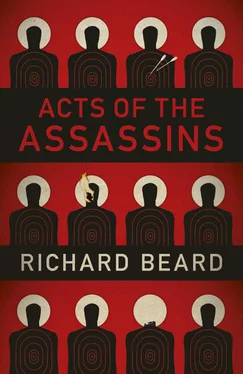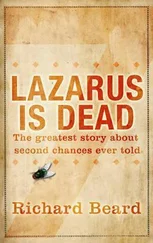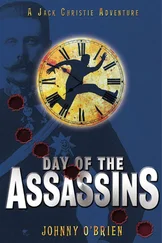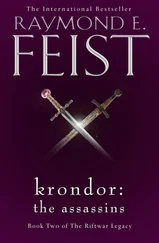Otherwise, apart from John and a sympathetic steward, few of Rome’s believers will have laid hands on a ticket. The performance is a sellout, the first full-length programme at the Circus Maximus since the fire, and a once-in-a-lifetime opportunity to see Peter the favourite disciple of Jesus. He will be alive then dead, all a man can ever be, with as a bonus attraction the possible second coming of a Messiah.
A blare of copper horns, silencing forty thousand voices. The Circus has a producer called the editor, who controls the running order. Today, the editor has decided, the early part of the entertainment will be understated about pain and death. A singing competition is won by the son of a government official. A theatre company performs an extract from a contemporary play — the plot a timeless mixture of coincidence, mistaken identity and a moral dilemma, but with the twist that demigods can intervene to advance the action. At the Circus Maximus the demigods of both sexes are young, oiled and intervene half-naked.
‘We could leave now.’ Claudia leans in close to Gallio, whispers into his ear. John is on his other side. ‘Get him out while we can. Beat the rush.’
‘He’s blind, not deaf. In any case, we’re staying for Jesus.’
‘You mean Peter. You’re getting the two of them mixed up.’
‘For Peter, then.’
But before Peter there’s chariot-racing, early rounds of Greens vs Reds and Blues vs Whites. The Blues crash, but the races never turn brutal until after the editor decides to spill some blood. With every new act and entrance, Gallio is terrified of seeing Alma. He knows about Valeria’s ruthless streak, but he can believe she’s crucifying Peter because she thinks it a reasonable step to take. Peter’s public crucifixion is a deterrent to say look, look again, Jesus isn’t much help to his friends. Targeting Alma doesn’t count as reasonable in any comparable way.
At close to four o’clock a carpet of flares announces the imminent arrival of the show’s star victim. The tunnel of smoke clears and the countdown begins: the beloved disciple of Jesus is in the arena. Peter carries a cross, and like Jesus he falls. No one vaults a barrier to help him, not in the Circus Maximus, with security as tight as it is.
A guard of four soldiers whips Peter into taking up his burden. Peter is the rock but the weight of the cross sways him, a fisherman on deck in a storm. His clothing has soiled in prison to shades of brown, and he is honestly unarmed for the fight. Grey-haired, bent-backed, Peter stumbles but does not fall, not again.
He suffers, but suffering is the price of salvation. For Peter eternity is within reach, where pain will have no meaning: he bears his burden because the soul will decide, not the body. He reaches the centre of the arena, drops the cross flat into a splash of sand. The soldiers offer him a gladiator’s trident to defend himself. Peter turns the weapon away, refuses to entertain.
John will hear the dogs even from the third tier. At opposite ends of the stadium handlers lean back against savage beasts straining at the leash, yowling, snapping, keening. John will supply his own visions to fit the sounds, but at the Circus Maximus he’ll also sense the feeling that’s growing among forty thousand spectators: Peter’s stadium meekness is unsatisfactory.
The bank of clouds is lower, darker. Peter refuses to defend himself and now this: no one wants rain.
Peter kneels in the centre of the arena. He prays. When dogs pull to within inches of his face, lunging at his eyelids, Peter doesn’t flinch. He doesn’t run and he doesn’t fight, which is curious then dull. The Circus crowd respects courage but Peter looks limp and timid, unlikely to provide a decent afternoon’s sport. He is a coward, and for the editor of the Circus Maximus Peter presents significant narrative problems.
An outbreak of booing, sporadic at first but increasing in volume. Slow handclaps. The editor releases a reserve of Christians, bundling them into the arena, about thirty women and children he’d been keeping back for later. He allows the crowd to settle, then gives the order: let loose the dogs.
His initiative is rewarded. These secondary disciples are less accepting of their fate than Peter, and half of them run. The runners survive, because the dogs leap at the faces and throats of the Christians who imitate Peter, those who fall to their knees and pray. Vicious, lazy, the dogs sate themselves on the sincere believers, but won’t move for the lesser Christians who, lacking in faith, run to save their lives. Everyone gets what they want.
The Circus today is misfiring. The production should feel like a show of strength, but on a darkening afternoon the prevailing mood is weakness. Horns. The editor has seen enough. Handlers with sticks beat the lethargic dogs and surviving Christians from the arena. In come the sweepers, who scrape bloodied sand into wheelbarrows and replace it with fresh. The renewed blondness of the arena is a promise of blood to come.
The editor needs to make Peter entertaining and the best he can do, with a performer Peter’s age who lacks fighting spirit, is crucifixion. But not a standard crucifixion, which would bore a knowledgeable crowd. The soldiers lay Peter down, and his lack of resistance allows them to arrange his arms and legs along the wood of the cross, which is flat to the ground. They nail him where he lies, and as the blood spurts, the booing fades. This is mildly diverting. A heavy bass drum beats time to the fall of the mallet. The editor wrests back control of the spectacle, though the crowd is familiar with the opening moves of a crucifixion. He will have to add value.
Oh that’s good, though, that’s an inspired variation. The Circus soldiers dig out a slot for the upright. Two of them haul on a rope, another crawls under the rising wood and pushes it up with his back until the cross, with Peter attached, is upright on its end and Peter is crucified upside down . Applause, from every section of the stands.
Excitement shivers through the stadium. A god worthy of esteem will have to react, if he has any pride, in front of forty thousand reasonable spectators who will be obliged to accept his existence. Come on, Jesus. You will never be offered a better opportunity than this. The veins swell in Peter’s inverted neck and head. His eyes, inches from the arena sand, roll into the top of the sockets. He lifts his head, tries to, but can’t reverse the blood pressure, the whites of his eyes filling out.
The stadium waits on god. Peter has an eleven-inch nail through each of his feet, Gallio notices, whereas for Jesus a single nail was enough. For Peter two nails are needed to take the weight. Peter’s knee-joints dislocate, and through curling toes Cassius Gallio feels for the underground warning of an earthquake, the tremble of the dead rising to welcome Jesus. For a bomb, an explosion, a terrorist atrocity. The spectacle is Peter crucified upside down, but the tension is in the wait for Jesus to intervene.
A low rumble, and Gallio looks to the heavy black clouds for Jesus descending. John clutches Gallio’s arm. Claudia keeps her eyes on the stands, scans for unusual movement in the tribunes. And again, a low rumbling sound, and Peter’s ankles pop, yes the undertone is louder and it is, Gallio now realises, the stomping of forty thousand pairs of feet acclaiming the editor’s work.
Peter’s head bangs against the wood of the inverted cross. His neck distends, ridged with obvious ligaments, and Cassius Gallio remembers, too late, that Peter is famous for botched miracles. He is the disciple who could not walk on water. He put his foot on the surface of Lake Galilee, waited a moment before applying some weight, saw his foot go under.
Peter is dying, and Gallio stares at a disciple’s public death, convinced he has a lesson to learn. He leans forward, and John holding tight is pulled forward with him. The upside-down crucifixion of Peter, Gallio speculates, reveals the mind of Jesus. This is the thought that Gallio allows to develop. Up is down and down is up. Right is left and the last are first. Death is life. Defeat is victory. Nothing in this world is as it seems.
Читать дальше












